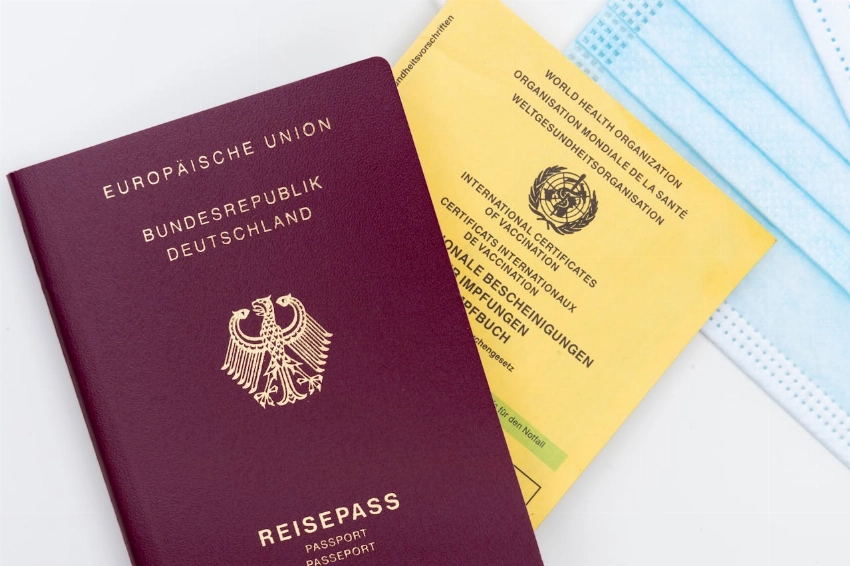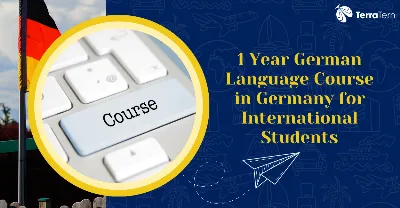Key Highlights
- What Are the Best 1 Year German Language Courses Available in Germany in 2025?
- What Visa Requirements Must International Students Meet for German Language Courses in 2025?
- How Much Do 1 Year German Language Courses Cost in Germany 2025?
- Which German Cities Offer the Best Language Learning Experience?
- What Career Opportunities Exist After Completing Language Courses?
- How Do Students Progress from Beginner to Advanced German in One Year? Experts Guide 2025
- What Are the Post-Course Options for International Students?
- Conclusion
The German language courses of 1 year german language course in germany for international students provide an A1-C1 track, which integrates classroom instruction, cultural immersion, and preparation for the tests DaF/DSH, perfect for the study, work, or integration objectives. The 18-30 lessons a week, small-group lessons, and flexible start dates are the standard characteristics of the programs in the largest cities, and the extras include accommodation and visa support.
Long-stay visa applicants require admission letters, evidence of funds, and long-stay visa health insurance. Graduates will commonly graduate to B2- C1 levels, which increase university eligibility and employability in Germany. The cost of tuition depends on the provider and the city.
What Are the Best 1 Year German Language Courses Available in Germany in 2025?

Germany provides the best 1 year German language course in Germany for international students through globally recognised integrated trainings that include the German language, culture, and pathway programs at German universities. Such well-balanced programs allow for various paths toward knowledge and vocational objectives, such as university admission and professional development.
Top 5 German Language Institutions Comparison:
|
Institution |
Course Duration |
Weekly Hours |
CEFR Progression |
Accommodation |
Suicide Rate |
|
Goethe Institut |
35 weeks (A1-C1) |
25 lessons |
A1 to C1 |
Host families/Hotels |
85-90% TestDaF pass |
|
Humboldt Institut |
25-35 weeks |
30 lessons |
A1 or B2 / C1 |
Residence halls |
80% University admission. |
|
BWS Germanlingua |
40+ weeks |
20-25 lessons |
A1- C1 |
Student housing |
75% certification success. |
|
University Res halls. |
2 semesters |
56-60 lessons |
A1-B2 |
Higher Education Program |
70% DSH eligibility |
|
Private Academies |
48 weeks old |
15-30 lessons |
A1 to C1 |
Many different options |
6580 completion. |
Which German Language Schools Accept International Students for Year-Long Programs?
1 year german language course in germany for international students are all welcome to take up extension programs at most of the good and reputable institutions teaching the German language, and the requirements for admission vary from institution to institution. Intensive courses are therefore a prerequisite for long-stay language visas, as they require at least 18 weekly lessons to be eligible for a visa.
-
The visa-related demands consist of the duly filled application forms. This passport should remain valid for at least a period of 12 months after the intended stay, evidence of financial means (EUR992-EUR1,091 a month), and health insurance cover. The students should exhibit motivation by providing their personal statements of how they learnt German and their future career directions.
-
Different institutions have different application timings, but most programs in the Goethe Institut receive rolling applications, and university-related programs run on semester-following patterns (starting both in October and April). BWS Germanlingua offers flexibility in Monday start dates, except for absolute beginners.
-
Placement is dependent on prerequisite levels, with the majority of schools and colleges requiring a placement test before courses can be started. Since the beginner level of the CEFR is A1 (complete beginner), the student has an opportunity to start on any level (from A1) up to the advanced level that demands a certified document of proficiency.
How Do Intensive vs Standard German Courses Compare?
Learning outcomes and visa eligibility for 1 year German language course in germany for international students depend greatly on intensive versus standard German courses.
Comparison of Strong vs. Weak German Courses:
|
Type of Course |
Hours Each Week |
Daily Schedule |
Speed of Progression |
Eligible for a Visa |
It Might Suit |
|
Intensive |
20-30 hours |
4-6 hours a day |
1 CEFR level/month |
Yes (18+ hours) |
Vehement learners. |
|
Plan |
15-20 hours |
3-4 hours a day |
1 CEFR level/6-8 weeks |
Yes (18+ hours) |
Balanced approach. |
|
Super Intensive |
30 or more |
6 or more per day |
1 CEFR level/3 to 4 weeks |
Yes |
Intensive progress. |
Also Read: Best German Language Learning Books for Beginners
What Visa Requirements Must International Students Meet for German Language Courses in 2025?
International students pursuing 1 year German language course in germany for international students must secure a Section 16a Language Acquisition Visa, which grants up to 12 months validity for intensive German language learning.
-
Section 16a Language Acquisition Visa - Required for 1 year German language course in germany for international students with up to 12 months validity and €75 application fee
-
Minimum Course Intensity Requirement - Classes must be intensive with at least 18 hours per week; evening or weekend-only courses do not qualify for visa eligibility
-
Financial Proof Mandate - €992 per month blocked account or equivalent sponsorship (€11,904 annually) plus language course premium of 10% additional funding
-
Health Insurance Coverage - Schengen travel insurance for initial entry, transitioning to German private student health insurance upon arrival for the complete duration
-
Processing Timeline - Applications take 3-12 weeks, depending on embassy location, with peak season delays extending up to three months, requiring planning
How to Apply for a German Language Course Visa from India?
Indian students must submit their applications through the German consulates in New Delhi, Mumbai, Chennai, Bangalore, or Kolkata, following the specific procedures outlined for Section 16a language acquisition visas.
-
German Consulate Locations - Applications processed through offices in New Delhi, Mumbai, Chennai, Bangalore, or Kolkata, with varying processing speeds and appointment availability
-
India-Specific Documentation - Notarised educational certificates, police clearance valid for six months, financial documents meeting German embassy standards with authorised translations
-
Appointment Booking Process - Online scheduling through the German mission portal, with 2-3 months' booking recommended during peak seasons (March-July)
-
Embassy Interview Focus - Assessment of genuine student intent, post-course plans, financial sustainability, and motivation for German language acquisition
-
Common Application Challenges - Insufficient financial documentation, inadequate course intensity proof, unclear accommodation arrangements causing delays or rejections
What Financial Documents Are Required for the Germany Visa Application?
The financial documents required for the visa application are:
-
Blocked Account Establishment - €11,904 deposit with approved German banks (Deutsche Bank, Fintiba, Expatrio) plus €89-€150 setup fees and monthly maintenance charges
-
Enhanced Funding Requirement - Language course applicants need €1,091 monthly (10% premium over standard €992), totalling €13,094 for comprehensive coverage
-
Alternative Sponsorship Options - Formal declarations of commitment (Verpflichtungserklärung) from German residents with €2,000+ monthly income and municipal authority confirmations
-
Limited Scholarship Opportunities - DAAD and cultural exchange programs offer occasional partial funding for language courses, typically covering tuition rather than living expenses.
-
Comprehensive Cost Breakdown - Monthly expenses include accommodation (€400-€800), health insurance (€110), transportation (€80-€200), food (€250-€400), miscellaneous (€150-€300) requiring €1,200-€1,500 total budget
|
Requirement |
Details/Amount |
Notes |
|
Visa Type |
Section 16a Language Acquisition |
Up to 12 months, €75 fee |
|
Course Intensity |
≥18 hours/week |
Evening/weekend only NOT ok |
|
Financial Proof |
€992+/month (~€11,904+/year) |
Blocked account or sponsor |
|
Health Insurance |
Schengen initial, private upon arrival |
Mandatory for duration |
|
Embassy Interview |
Motivation, finances, intent |
All applicants |
|
Processing Timeline |
3-12 weeks |
Maybe longer in peak months |
How Much Do 1 Year German Language Courses Cost in Germany 2025?

The cost of 1 year German language course in germany for international students varies significantly by institution type and location, ranging from €1,000-€6,000 annually for tuition alone, with total expenses including living costs reaching €15,000-€25,000 for the complete year. Major cities like Munich and Frankfurt command premium pricing, while smaller university towns offer more affordable options.
Cost Comparison by Institution Type (2025 Pricing)
|
Institution Type |
Annual Tuition |
Weekly Hours |
Course Duration |
Total Program Cost |
|
Goethe Institut |
€2,400-€4,800 |
25 lessons |
35 weeks |
€3,500-€6,500 |
|
Private Schools |
€1,500-€6,000 |
20-30 lessons |
40-48 weeks |
€2,500-€8,000 |
|
University Programs |
€1,000-€3,000 |
18-20 lessons |
2 semesters |
€1,800-€4,200 |
|
Humboldt Institut |
€3,200-€5,800 |
30 lessons |
25-35 weeks |
€4,500-€7,500 |
|
BWS Germanlingua |
€2,000-€4,500 |
20-25 lessons |
40+ weeks |
€3,200-€6,200 |
What Additional Expenses Should Students Budget For?
Beyond tuition costs, 1 year German language course in germany for international students requires a comprehensive budget for accommodation, insurance, transportation, and living expenses totalling €10,000-€15,000 annually.
-
Accommodation Costs By Major Cities - Berlin (€400-€700 monthly shared, €600-€1,000 studios), Munich (€600-€1,200 shared, €800-€1,500 studios), Hamburg (€500-€900 shared, €700-€1,300 studios) representing 40-60% of total monthly budget for 1 year german language course in germany for international students
-
Health Insurance Premiums - Mandatory coverage ranging €35 €110 monthly, with students under 30 qualifying for public insurance at €110, while older students require private coverage averaging €60 €150 monthly plus co-payments for medical services
-
Study Materials And Examination Fees - Textbooks cost €100-€300 annually, digital learning platforms €50-€150, TestDaF examination €195, DSH certification €150, plus course materials and supplementary resources totaling €400-€800 yearly
-
Transportation Expenses - Monthly public transport passes cost €60-€100 in major cities, plus occasional intercity travel for visa appointments, cultural immersion trips, and semester breaks, averaging €80-€200 per month.
Are There Scholarships Available for International Students?
Scholarship opportunities for 1 year German language course in germany for international students remain limited compared to degree programs, with most funding targeting university preparation rather than standalone language acquisition.
-
Daad Scholarship Programs - Limited funding through cultural exchange initiatives offering €500-€1,500 monthly stipends for 6-12 month language programs, requiring strong academic backgrounds and clear post-course university intentions for 1 year German language course in germany for international students
-
Institution-Specific Financial Aid - Goethe Institut provides need-based fee reductions of 10-30% for qualified applicants from developing countries, while private schools offer early payment discounts (5-15%) and occasional merit-based partial scholarships.
-
Government Scholarships From India - Indian Council for Cultural Relations (ICCR) and the Ministry of External Affairs offer limited cultural exchange programs covering partial expenses (€300-€800 monthly) for selected candidates with demonstrated academic excellence.
-
Private Foundation Opportunities - Konrad Adenauer Foundation, Heinrich Böll Foundation, and DAAD partnerships provide language course supplements ranging €200 €800 monthly for qualified applicants with financial need and clear career objectives in Germany.
Also Read: Learn German Language Free | Master German Without Cost
Which German Cities Offer the Best Language Learning Experience?
German cities provide distinct advantages for 1 year German language course in germany for international students, with each offering unique combinations of educational quality, cultural immersion, and cost considerations. The choice of city has a significant impact on learning outcomes, living expenses, and post-course opportunities.
City Comparison for Language Students (2025)
|
City |
Monthly Living Cost |
Language Schools |
Cultural Activities |
International Community |
Job Opportunities |
Housing Availability |
|
Berlin |
€900-€1,300 |
25+ institutions |
Excellent (museums, theatres) |
Very High (30% international) |
High (startups, tech) |
Moderate |
|
Munich |
€1,200-€1,800 |
20+ institutions |
Outstanding (festivals, arts) |
High (25% international) |
Excellent (finance, tech) |
Limited |
|
Hamburg |
€1,000-€1,500 |
15+ institutions |
Good (maritime culture) |
Moderate (20% international) |
High (media, logistics) |
Good |
|
Cologne |
€950-€1,400 |
18+ institutions |
Very Good (media, arts) |
High (22% international) |
Good (media, business) |
Good |
|
Frankfurt |
€1,100-€1,600 |
12+ institutions |
Good (finance district) |
Very High (28% international) |
Excellent (banking, aviation) |
Moderate |
|
Dresden |
€700-€1,100 |
8+ institutions |
Good (historic culture) |
Moderate (15% international) |
Moderate (engineering) |
Excellent |
How Does Student Life Differ Across German Cities?
Student Life Differ Across German Cities as follows.
-
Student Communities And International Networks - Berlin hosts the largest international student population (200,000+ students, 30% international) with extensive language exchange programs, while Munich offers smaller but highly engaged communities through university partnerships and business networking events for 1 year German language course in germany for international students.
-
Cultural Activities and Language Practice Opportunities - Berlin provides unlimited museum access, weekly language cafes, and cultural festivals throughout the year, while Munich excels in traditional German cultural immersion through Oktoberfest, Christmas markets, and Alpine activities, creating authentic conversation practice.
-
Part-Time Work Availability - Students can work 120 full days or 240 half days annually, with Berlin offering the most startup and tech opportunities (€10-15/hour), Munich providing premium service sector jobs (€12-18/hour), and Hamburg specialising in logistics and media positions
-
Housing Availability and Costs - Berlin offers moderate availability at €400-700 monthly for shared accommodations with extensive public transport, Munich faces severe housing shortages requiring early applications at €600-1,200 monthly, while smaller cities like Dresden provide abundant options at €300-600 monthly.
What Career Opportunities Exist After Completing Language Courses?
Career Opportunities Exist After Completing Language Courses.
-
Transition To University Studies In Germany - C1 certification from recognised programs enables direct application to German universities with 85-90% admission success rates for international students, bypassing additional language requirements and qualifying for reduced tuition fees at public institutions for 1 year German language course in germany for international students
-
Job Market Opportunities For German Speakers - B2-C1 proficiency opens positions in multinational corporations, with starting salaries ranging €35,000 €55,000 annually for graduates, particularly in engineering, IT, finance, and healthcare sectors, where German language skills command 20-30% salary premiums.
-
Professional Networking And Internship Possibilities - Language course alumni gain access to exclusive job fairs, professional associations, and internship programs through school partnerships, with 70% of graduates securing employment or further education within six months of completion
-
Return to India With Enhanced Language Skills - German-speaking professionals in India earn average salary premiums of 25-40% in automotive, manufacturing, and technology sectors, with major German companies like BMW, Siemens, and SAP actively recruiting bilingual candidates.
How Do Students Progress from Beginner to Advanced German in One Year? Experts Guide 2025

Students' Progress from Beginner to Advanced German in One Year is as follows:
-
Months 1-3: A1 to A2 Foundation Building - Students master basic German greetings (Guten Tag, wie geht es Ihnen?), numbers, essential vocabulary (500-800 words), and simple present tense constructions, enabling basic shopping, restaurant interactions, and personal introductions during 1 year German language course in germany for international students
-
Months 4-6: A2 to B1 Intermediate Development - Learners acquire past tense usage (Ich bin gestern nach Berlin gefahren), complex sentence structures, workplace vocabulary, and can handle most daily situations, including banking, healthcare appointments, and casual conversations with native speakers
-
Months 7-9: B1 to B2 Professional Competency - Students develop subjunctive mood mastery (Ich würde gerne), advanced grammar structures, professional terminology, and can participate in business meetings, university lectures, and complex discussions about abstract topics with 2,000+ vocabulary words
-
Months 10-12: B2 to C1 Advanced Fluency - Advanced learners achieve near-native expression with idiomatic usage (Das ist nicht mein Bier), sophisticated argumentation skills, academic writing proficiency, and can handle specialised professional contexts requiring nuanced communication.
What Study Methods Are Most Effective for Intensive Language Learning?
The methods are most effective for intensive language learning:
-
Classroom Instruction Combined With Cultural Immersion - Intensive programs offering 20-30 weekly lessons supplemented by mandatory cultural activities, city tours, museum visits, and authentic German experiences create optimal learning environments for 1 year German language course in germany for international students, improving retention rates by 40-50%.
-
Technology-Enhanced Learning Platforms - Digital tools like Babbel, Duolingo Plus, and institutional e-learning systems provide personalised practice, immediate feedback, grammar drilling, and pronunciation training, with successful students dedicating 1-2 additional hours daily to app-based learning.
-
Peer Learning And Conversation Exchange Programs - Tandem partnerships with native German speakers, international student discussion groups, and structured conversation circles enable practical application, cultural understanding, and confidence building through regular speaking practice outside formal classroom settings.
-
Regular Assessment And Progress Tracking - Weekly vocabulary tests, monthly speaking evaluations, quarterly CEFR assessments, and continuous feedback mechanisms help students identify learning gaps, maintain motivation, and adjust study strategies for optimal progression.
How Can Students Practice German Outside the Classroom?
Students' practice of German outside the classroom is as follows:
-
Local Community Involvement Opportunities - Joining German sports clubs (Sportvereine), volunteer organisations, neighbourhood associations, and local hobby groups provides authentic conversation practice while building meaningful relationships with native speakers during 1 year German language course in germany for international students.
-
Professional Networking Events - Attending industry meetups, career fairs, professional association gatherings, and business networking events offers workplace vocabulary practice, cultural business etiquette learning, and potential internship or job opportunities for language students
-
Cultural Activities And Volunteer Work - Participating in theatre groups, art exhibitions, music festivals, environmental projects, and social service organisations enables immersive cultural experiences while contributing to German society and practising specialised vocabulary.
-
Digital Resources And Apps For Continued Learning - Utilising German podcasts, YouTube channels, news websites (Deutsche Welle, Tagesschau), streaming services with German subtitles, and language exchange apps like HelloTalk maintain consistent exposure and practice outside formal instruction.
Also Read: Best German Language Classes Online: Free & Paid Choice
What Are the Post-Course Options for International Students?
The post-course options for international students are:
-
University Application Processes With Language Certification - Graduates of 1 year German language course in germany for international students with C1 certification can directly apply to German universities without additional language requirements, accessing over 400 English-taught programs and qualifying for €0 tuition at public institutions
-
Work Visa Transition Possibilities - Language course completers can transition to job-seeker visas (18-month validity) or skilled worker visas with German proficiency, providing 25-30% salary advantages in multinational corporations, particularly in automotive, engineering, and IT sectors
-
Professional Development Opportunities - Advanced German speakers access specialised training programs (Ausbildung), professional certifications, and corporate internships with major German companies offering structured career advancement paths and long-term employment prospects.
-
Return To Home Country With Enhanced Qualifications - German-speaking professionals in India command premium salaries (25-40% increase) in automotive, manufacturing, technology, and consulting sectors, with German companies actively recruiting bilingual talent for expansion projects.
Can Students Extend Their Stay for Further Studies?
Yes, students can extend their stay for further studies:
-
Student Visa Application Requirements - Language course graduates must obtain university admission letters, demonstrate financial resources (€11,904 blocked account), maintain health insurance coverage, and submit applications 3-4 months before course completion for a seamless transition without leaving Germany.
-
University Admission Processes - C1 certification holders can apply directly to degree programs through the uni-assist portal, with application deadlines falling on December 15 (summer semester) and July 15 (winter semester), requiring authenticated academic transcripts and motivation letters.
-
Preparatory Course Options (Studienkolleg) - Students with B2 proficiency can enrol in specialised preparation programs lasting 2 semesters, focusing on subject-specific German terminology for engineering, medicine, business, or social sciences before university matriculation.
-
Timeline Planning For Seamless Transitions - Optimal planning involves university applications during months 8-10 of language courses, visa transition paperwork in months 10-11, and confirmation of enrollment by month 12 to avoid gaps in legal residence status.
What German Language Certifications Are Internationally Recognised?
The German language certifications that are internationally recognized are:
-
Goethe-Zertifikat Recognition And Applications - Globally accepted by universities, employers, and immigration authorities in 90+ countries, with levels A1-C2 providing standardised proficiency proof for 1 year German language course in germany for international students, particularly valued by German corporations and educational institutions worldwide
-
Testdaf For University Admissions - Essential certification for degree programs at German universities, requiring a minimum level 4 (equivalent to B2-C1) across all four skills, accepted by 95% of German higher education institutions, and costing €195 for examination
-
TELC Certificates For Professional Use - Business-focused certifications (TELC Deutsch B1-C1 Beruf) designed for workplace communication, vocational training applications, and skilled immigration requirements, with specialised modules for healthcare, technical, and commercial sectors
-
DSH for Academic Purposes - University-specific language examination (Deutsche Sprachprüfung für den Hochschulzugang) required by individual institutions, typically administered twice yearly, with DSH-2 level (B2-C1 equivalent) qualifying for most academic programs
Conclusion
A 1 year German language course in germany for international students represents a transformative investment that unlocks exceptional opportunities across academic, professional, and personal dimensions. Graduates achieve C1 proficiency, enabling direct university admission to world-class institutions with zero tuition fees, while accessing Germany's robust job market offering 25-40% salary premiums for bilingual professionals.
The immersive experience provides authentic cultural integration, enhanced cognitive abilities, and strategic networking within Europe's largest economy, positioning students for long-term success in international careers, research collaborations, and a potential EU residency pathway.
To learn more about the German language course, contact TerraTern right away!






